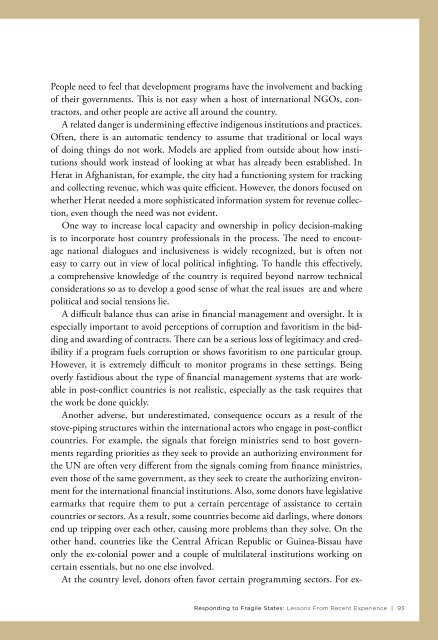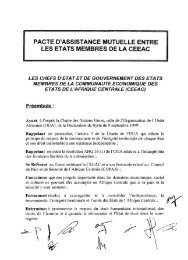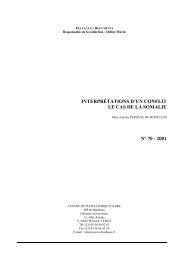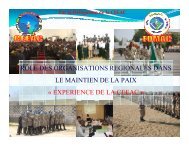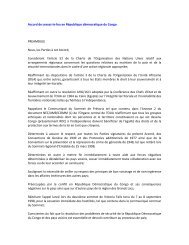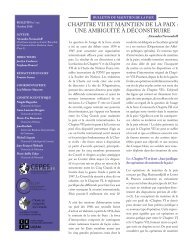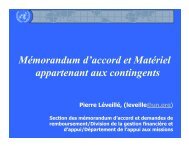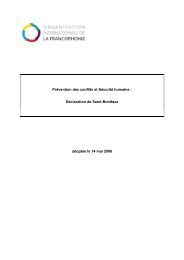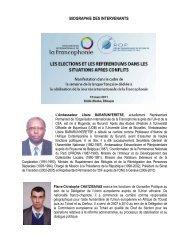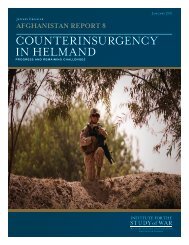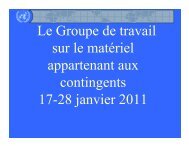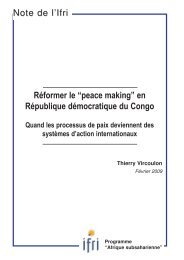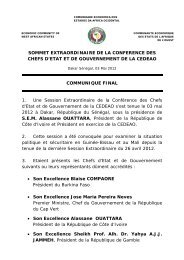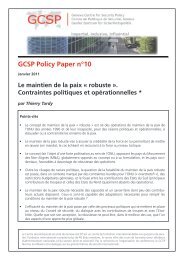engaging fragile states - Woodrow Wilson International Center for ...
engaging fragile states - Woodrow Wilson International Center for ...
engaging fragile states - Woodrow Wilson International Center for ...
You also want an ePaper? Increase the reach of your titles
YUMPU automatically turns print PDFs into web optimized ePapers that Google loves.
People need to feel that development programs have the involvement and backing<br />
of their governments. This is not easy when a host of international NGOs, contractors,<br />
and other people are active all around the country.<br />
A related danger is undermining effective indigenous institutions and practices.<br />
Often, there is an automatic tendency to assume that traditional or local ways<br />
of doing things do not work. Models are applied from outside about how institutions<br />
should work instead of looking at what has already been established. In<br />
Herat in Afghanistan, <strong>for</strong> example, the city had a functioning system <strong>for</strong> tracking<br />
and collecting revenue, which was quite efficient. However, the donors focused on<br />
whether Herat needed a more sophisticated in<strong>for</strong>mation system <strong>for</strong> revenue collection,<br />
even though the need was not evident.<br />
One way to increase local capacity and ownership in policy decision-making<br />
is to incorporate host country professionals in the process. The need to encourage<br />
national dialogues and inclusiveness is widely recognized, but is often not<br />
easy to carry out in view of local political infighting. To handle this effectively,<br />
a comprehensive knowledge of the country is required beyond narrow technical<br />
considerations so as to develop a good sense of what the real issues are and where<br />
political and social tensions lie.<br />
A difficult balance thus can arise in financial management and oversight. It is<br />
especially important to avoid perceptions of corruption and favoritism in the bidding<br />
and awarding of contracts. There can be a serious loss of legitimacy and credibility<br />
if a program fuels corruption or shows favoritism to one particular group.<br />
However, it is extremely difficult to monitor programs in these settings. Being<br />
overly fastidious about the type of financial management systems that are workable<br />
in post-conflict countries is not realistic, especially as the task requires that<br />
the work be done quickly.<br />
Another adverse, but underestimated, consequence occurs as a result of the<br />
stove-piping structures within the international actors who engage in post-conflict<br />
countries. For example, the signals that <strong>for</strong>eign ministries send to host governments<br />
regarding priorities as they seek to provide an authorizing environment <strong>for</strong><br />
the UN are often very different from the signals coming from finance ministries,<br />
even those of the same government, as they seek to create the authorizing environment<br />
<strong>for</strong> the international financial institutions. Also, some donors have legislative<br />
earmarks that require them to put a certain percentage of assistance to certain<br />
countries or sectors. As a result, some countries become aid darlings, where donors<br />
end up tripping over each other, causing more problems than they solve. On the<br />
other hand, countries like the Central African Republic or Guinea-Bissau have<br />
only the ex-colonial power and a couple of multilateral institutions working on<br />
certain essentials, but no one else involved.<br />
At the country level, donors often favor certain programming sectors. For ex-<br />
Responding to Fragile States: Lessons From Recent Experience | 93


